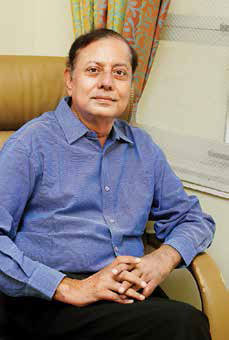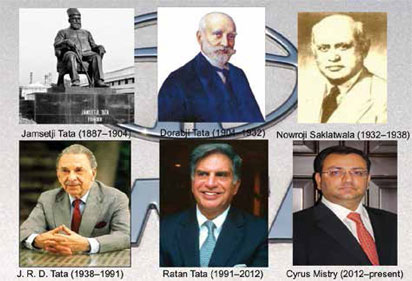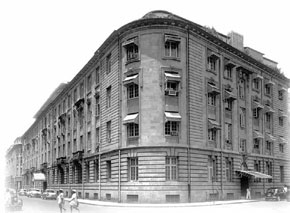
The ‘Tatas’ are in the headlines today for the wrong reasons. The chairman of Tata Sons has been sacked, and dirty linen is being publicly washed. What went wrong or which side is correct will be known only with the passage of time. But it is really sad. It is a dent to the corporate legend known for its integrity. The group which is highly respected for its ethical values and corporate governance has been brought to stand in the dock today. There are media reports about leaked inside information, which is really painful. It is beyond my competence to speak anything on the current situation, but it will not be inappropriate to speak about the Group and to also give my personal observations.
The world is divided into those who want to be something and those who want to do something. The Tata clan obviously belongs to the second category. The rise of Tatas as India’s premier business dynasty is a story which began in 1839 when Jamsetji Nusserwanji Tata was born in a family of priests in Navsari. After initial trading ventures in Hong Kong and Europe, Jamsetji started a private import export firm in 1868 with a capital of Rs.21,000 and this is how the Group was born. It was not just the birth of a business but the start of a revolution in industries in India. It is said that Jamsetji had a vision to start industries in the core areas to make the country economically vibrant. He was a nationalist and wanted to give back to the society. In 1893, he had a chance meeting with Vivekanand on a ship. The Swami was on his way to speak at the first ever Parliament of World’s Religions where he gave the message of unity and harmony of all religions while Tata was on his way to seek steel technology that would make India a strong nation. The Swami remarked to the nationalist businessman, “How wonderful it would be if we combine scientific and technological achievements of the west with the asceticism and humanism of India.”
Swami Vivekanand must have made a lasting impact on Jamshetji as is evident from his subsequent actions in business and philanthropy. Deeply influenced by Vivekanand, he donated almost 50 per cent of his personal wealth to start the institute for scientific research-IIScin Bengaluru. This well-known institute of science got started after his death and even today is one of the best institutes in the country. Prior to his death in 1904, Jamsetji was able to establish four companies: Empress Mills, Swadeshi Mills, Ahmedabad Advance Mills and Taj Mahal Hotel. Tata Steel Company at Jamshedpur was in the process of getting commissioned when he died and the work was completed by his son Dorabji Tata in 1907. The Tata Group today is an Indian multinational conglomerate with global presence. The Group has 30 public listed companies with 660,000 employees with a combined revenue of more than Rs. 650,000 crores .The market capitalisation of the Group as on March 2016 is $116 billion. The Group has the unique position of creating some of the best institutions in all sectors like TIFR, TISS, Tata Memorial Cancer Hospital, NCPA and the earlier mentioned IISc. The Group has many charitable trusts. In FY 2015-16, the Group spent Rs. 750 crore on charity. As early as 1892, the charitable trust in the name of J N Tata Endowment scheme was started to finance scholars to go abroad for higher studies.
The Tata Group exhibits a unique form of shareholding as the apex company, Tata Sons that owns all other companies is itself in turn owned more than 60 per cent by non-profit trusts. Hence either the profits stay with Tata Sons and redeployed for business or is given to the Trusts for non-profit philanthropic activity. To have philanthropy at the top of the pyramid of ownership is remarkable. The bottom line principle of Tata companies is to operate not only for the owner, shareholders but for the benefit of all stake holders like customers, employees and the society at large.
“The world is divided into those who want to be something and those who want to do something. The Tata clan obviously belongs to the second category. The rise of Tatas as India’s premier business dynasty is a story which began in 1839. It was not just the birth of a business but the start of a revolution in industries in India“
The companies in the Group are in businesses ranging from salt to software, but they function as enlightened corporate citizens on ethical and moral principles. The impact of Swami Vivekanand on the founder of the Tata Group is very much visible even today. Also, the nationalistic thought of Jamshetji exhibited when he started the Taj Mahal Hotel in Bombay. While visiting abroad he did not get proper respect when he wanted to check into a prestigious hotel as he was an Indian, and this triggered him to open a real big hotel in India. Today, the Tata Group is the biggest employer in Britain.
Including Jamsetji, Tata Sons had five chairmen from the Tata family over the years, and each of them contributed to the growth of the Group. Cyrus Mistry was the sixth chairman and he was the only one from outside the Tata family. After the death of Jamsetji in 1904, his elder son Dorabji became chairman. He remained chairman from 1904 to 1932. For a short time Now roji Saklatwala was the chairman from 1932 to 1938 and then came JRD Tata who had a long innings from 1938 to 1991. Ratan Tata succeeded JRD and he held the chair till 2012 when he took voluntary retirement as per his self-created retirement policy.

Cyrus Mistry was selected by the selection committee to succeed Ratan Tata. Cyrus Mistry happened to be on the Board of Tata Sons since 2006. Pallonji Mistry, the father of Cyrus Mistry, is the single biggest individual shareholder of Tata and Sons with a shareholding of 18.5 per cent. The Shapoorji Pallonji group to which Cyrus Mistry belongs is an old and respected group engaged in the construction business. Cyrus Mistry had to demit office in 2016 as his services were terminated by the Board of Tata Sons.
On becoming chairman, Dorabji fulfilled the dreams of the founder chairman and his late father. He started with completing the unfinished agenda of Jamsetji Tata. Tata Steel got started in 1907 and then Tata Power in 1911. He also founded leading insurance companies, New India Assurance Company and General Insurance Company Ltd. He was also a pioneer in his contribution to scientific research for the development of the country.
The Tata Group reached its peak during the long tenure of JRD. He was a man of action who nurtured the Tata empire but at the same time thought for the country as a whole. He had worked for a year in the French army as he was born in France and had lived there in his early years. He was an avid aviator too. His army discipline and passion for flying gave him the unique ability to see dreams that reached the sky and then work hard to achieve them. Companies in the Group mushroomed during his period. Some of the companies added to the group by him are Tata Motors, Tata Chemicals, Tata Consultancy Services, Voltas, Titan, etc. JRD is also considered the father of civil aviation in India. In his initial period as chairman, he had started Tata Airlines which ultimately became the Air India of today. It is said that he devoted more time to Air India, a government of India undertaking as its initial chairman than to his own companies of the Tata Group. He believed in what he said, “Live life a little dangerously.” He worked taking risks while adding new companies to the Group. But while working for the Group, he never lost sight of his bigger purpose of life and that was development for the country.
“The Tata Group exhibits a unique form of shareholding as the apex company, Tata Sons that owns all other companies is itself in turn owned more than 60 per cent by non-profit trusts. Hence either the profits stay with Tata Sons and redeployed for business or given to the Trusts for non-profit philanthropic activity. To have philanthropy at the top of the pyramid of ownership is remarkable”
He said, “no success or achievement in material terms is worthwhile unless it serves the needs or interest of the country and its people and is achieved by fair and honest means.” For the work done for the country, the obliged nation awarded him the highest award, ‘Bharat Ratna’ in 1992. He was a real team builder and built the team with affection and vision. The real leaders were promoted to head the companies of the Group and the companies functioned as autonomous entities with guidance from Tatas Sons in times of need. Some great institutions of the country were founded by him which spoke for his nationalistic zeal. While building the ‘Tata Brand’, he had a clear idea that a lasting brand can be built by following the principle of high integrity and quality products. He saw to it that he would never give bribes for any work. I remember hearing from my colleagues in the tax department that Tatas are big litigants and that they would fight each legal battle, but would not indulge in tax evasion. It was JRD himself who used to thank small tax officers for early refunds and showed his modesty.
It was common knowledge that JRD lived simply. He motivated youngsters. Ratan Tata succeeded JRD and it was real tough for him to follow JRD’s act. Ratan Tata went for some big overseas acquisitions. Tata Steel acquired the Anglo-Dutch company, Corus. Tata Motors acquired the Jaguar and Land Rover business from Ford. Tatas became the biggest employer in Britain. Side-by-side, he enthusiastically managed the existing group companies. He will also be remembered for bringing the world’s cheapest car, Nano. He demitted his chair based on his self-created rule of retirement in 2012 and then Cyrus Mistry succeeded him. Ratan Tata will be remembered as a low profile business tycoon who lived simply but thought big and thought internationally. ‘Brand Tata’ became synonymous with ‘Brand India’ in the international commercial world.

The success of large corporations in the private sector provides the fuel that lights up the nation as a whole. The Tata Group has played a lead role in this endeavour. It has also played a pivotal role in enhancing the brand appeal of India Inc. internationally. “Tata—integral part of Indian life” was a TV commercial of a happy Tata Steel sometime back. The triumphant commercial was not off the mark. You wake up in India with a sip of hot Tata tea; go to office in a Tata sedan or in Tata bus, wear a Titan watch on your wrist for the whole day and come home and relax with Tata Sky controlled TV shows and probably end the day with a Tata marketed Starbucks coffee. Not to forget, the taste of the food we eat provided by Tata salt. The Tatas have been major partners in nation building as they brought our oldest steel company and power companies to serve our core sectors. For the nation to grow, economic health has to be nurtured and the government cannot do this alone. The country requires partners and hence the role of business groups. The Tatas have proved that they are not only the first, but one of the most reliable partners for the nation. These days companies have very low longevity and in this context if some companies have served the nation for more than 100 years, then it is really creditable. Tatas have given some such companies which are now more than 100 years old and still growing. The contribution of Tatas is equally praiseworthy in sectors other than the economic sector. They have given the greatest institutions in the field of education, scientific research, social science research, cancer care and research, environmental science and arts.
“The Tatas have also been pioneers in the field of human resource development in the corporate world. Analysts call the group “a model of good behaviour”. Tata Steel began an eight-hour work day in 1912, much before it began in the US and Europe. It started leave with pay in 1920, 25 years before it became law in India”
In totality, the Tatas cannot be considered only a business group working to earn profit but an agent to bring all-out development for the country and its people. The Tatas have also been pioneers in the field of human resource development in the corporate world. Analysts call the group ‘a model of good behaviour’. Tata Steel began an eight-hour work day in 1912, much before it began in the US and Europe. It started leave with pay in 1920, 25 years before it became law in India.
Business is meant for creating wealth. The Tatas also did create wealth, but with a difference. They created wealth for the society. We require many business groups like the Tatas for our country and for our people. For the Tatas, a business that makes nothing but money is a poor kind of business. Will it not hurt if something wrong happens to the Tatas? Something really bad happened that the person who was selected to head the Group after four years of search had to be moved out just after four years of his being at the top. It is sad because it brings the Tatas into unnecessary controversy. But I am sure it will die down soon. This Group has seen two World Wars and it kept moving upwards. This present problem will not prove more than a small knock. In my opinion, let the concerned government departments or Stock Exchange verify the allegations brought out into the open by the leaked letter of Cyrus Mistry, and I am sure nothing wrong will be found. This will stop the gossip around the Tatas and the group will begin a new innings with a new selected chairman with more sparkle and verified credibility. Companies which have skeletons in their cupboards need to be afraid of any enquiry, but not the Tatas. “A brand for a company is like a reputation for a person. You earn reputation by trying to do hard things well,” said Jeff Bezos, the owner of Amazon. Tatas have worked for 148 years doing hard things nicely and in the process created the highly respected ‘Tata Brand’. The brand will keep shining, helped by top professionals on the top despite the possible absence of people from the Tata clan. “If people like you, they will listen to you, but if they trust you they will do business with you,” said Zig Ziglar. People not only love the name Tata, but also trust this name and hence business with Tata will keep on growing and increasing. We want the Tatas to grow. We want the Tatas to provide employment to our youth—unemployment is one of our biggest problems. We also want the youth to flourish imbibing the Tata values and culture. Tatas! You command our respect and so our best wishes to you.
By S K Jha